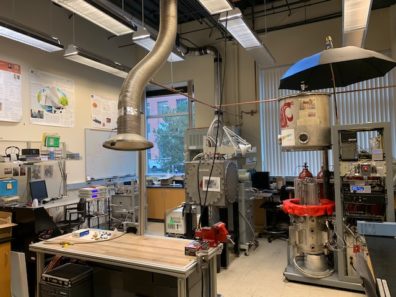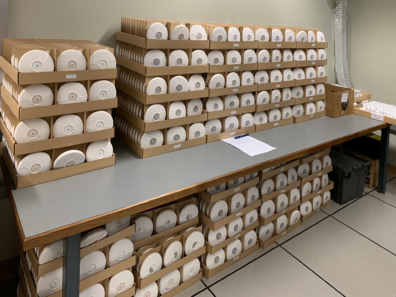Centers, Labs, and Institutes
Below are a few of the Centers, Labs and Institutes Voiland College operates. A comprehensive list can be found on the Voiland College’s Centers, Institutes, and Laboratories page.
Institute for Materials Research
The Institute for Materials Research (IMR), previously the Center for Materials Research (CMR), conducts interdisciplinary research in areas including atomic calculations, ceramic processing and characterization, environmental degradation, time resolved X-Ray analysis and super plasticity.



Composite Materials & Engineering Center
The Composite Materials & Engineering Center (CMEC) develops new building materials from a range of recycled and virgin resources. They also develop innovative structural systems to effectively use new materials while maintaining economic viability and public safety.



Energy System Innovations Center
The Energy System Innovations Center (ESIC) unites research faculty, business leaders, and governmental organizations to address the demand for clean, reliable energy, including using Smart Grid technology to make the power system more efficient, responsive, and secure.



Hyper Lab
The HYPER laboratory’s mission is to efficiently advance the technology readiness level of hydrogen systems for the benefit of humanity. This mission has primarily focused on small-modular hydrogen liquefaction systems for renewable energy, and liquid hydrogen storage and dispensing systems for aerospace applications. HYPER lab facilities include a testing area in the Engineering Teaching and Research Laboratory (ETRL) and an equipment research and assembly site in Thermal Fluids. The lab also has an outdoor liquid hydrogen testing facility for the development of small-modular hydrogen liquefiers, liquid hydrogen transfer equipment, and general hydrogen safety testing benefiting from an outdoor Class 1 Dev 1 area.



Keck Biomedical Materials Lab
The W.M. Keck Biomedical Materials Research Lab’s bio-engineering research is focused in two broad areas – materials and structures for implants and drug delivery, and micro-machined ultrasonic transducers in biomedical imaging and therapeutics.
Lab for Atmospheric Research
The Laboratory for Atmospheric Research (LAR) conducts air quality research, emphasizing biosphere/atmosphere interactions and regional air quality measurements and modeling.



The Materials Testing Lab
The Materials Testing Lab located in ETRL 122 houses the Materials testing machines including a four post tensile/fatigue testing with an environmental chamber, a small two-post tension tester with digital image correlation setup, and a bi-axial, tension-torsion, testing system. For more information, please contact Dr. David Field at dfield@wsu.edu.
Smart Homes Lab
The CASAS Smart Home Lab uses a variety of sensor platforms and mobile devices to enhance people’s daily lives. Using novel machine learning and artificial intelligence principles, researchers create smart home algorithms that work to understand and interact with residents. Using activity recognition and learning the resident’s individual patterns, these smart homes can improve energy efficiency, provide timely prompts for various tasks, and help residents live independently while reducing caregiver burden. With over 150 smart home study sites deployed in real-world scenarios spanning more than a decade, researchers can test their algorithms in a wide variety of situations using historical and live data sets that provide real-time feedback. In addition, the CASAS Lab routinely collaborates with researchers of different disciplines, including those in Nursing, Psychology, Indoor Air Quality, Robotics, and those overseas to design systems that are utilized across many areas of research and continue to improve our everyday lives.



Sport Science Lab
The Sports Science Laboratory investigates and models the effects of sports-related injuries on the body, particularly for head trauma.



VSCEB Surface Analysis Center
The In Situ Reactive Surface Analysis Center within the Gene and Linda Voiland School of Chemical Engineering and Bioengineering is one of the world’s foremost collection of chemical reactive surface analysis under in situ and operando conditions. The Center currently includes equipment for Raman spectroscopy, X-ray diffraction, and X-Ray photoelectron spectroscopy under active reaction conditions.



Washington Center for Asphalt Technology
The Washington Center for Asphalt Technology (WCAT) is one of about a dozen university-based asphalt technology labs around the country equipped to carry out bituminous and asphalt concrete testing in compliance with the newly adopted Superpave system. Superpave is a method to test performance of paving materials under specific environmental and engineering conditions. The lab features $500,000 in equipment for design of asphalt mixes to meet Superpave specifications.